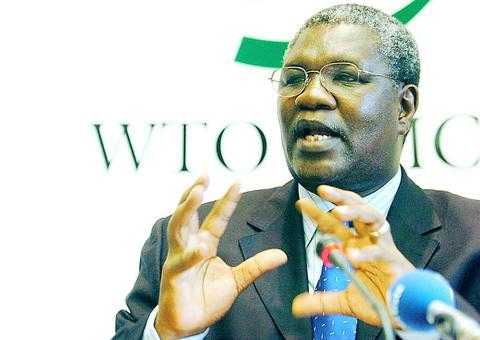Negotiators at the WTO moved closer to a crucial agreement on salvaging global trade talks yesterday as they said an accord on the thorny issue of agriculture was within reach.
Working on borrowed time after a missed deadline on Friday night, the WTO's 147 member states struggled to overcome their differences and agree on a draft framework to revive a multi-billion-dollar trade round.

PHOTO: EPA
A core group of about 20 delegates, representing all parties to the global trading club from rich to poor, reconvened at the WTO's Geneva headquarters in a last ditch attempt to hammer out the long-awaited deal after working long into the night on the farming text.
The stakes here are high, as failure to strike an accord this weekend would likely wreck immediate chances of reviving the stalled Doha talks this year, while casting a shadow over the entire multilateral trading system.
After almost three years of negotiations and, most recently, five days of intense meetings in Geneva, wealthy and developing countries appeared close to a breakthrough on how to tackle farming issues, which helped to topple a ministerial meeting in Mexico last year, stalling the Doha round.
"A consensus on an agricultural framework is within our grasp. There are some remaining problems of an important, though not irreconcilable, nature," the WTO's chief spokesman, Keith Rockwell, told reporters.
The debate on farming had finished and delegates were discussing another hot topic -- industrial import tariffs, also known as non-agricultural market access.
"We are moving on to other issues. We hope that in the near future we can get a full agreement on a July package," Rockwell said.
The Group of 90 poorest countries said they could live with the farm draft provided progress is made on industrial tariff reduc-tions, which cover a range of products from cars to cellphones.
"They have not got all that they wanted but they are willing to move the process forward ... we are willing to support the text," said a delegate from an African nation, who asked to remain anonymous.
Boosting the rare sense of agreement, EU Agriculture Commissioner Franz Fischler confirmed that the EU was ready to okay farming.
"I think we have the capacity to say yes to the agreement," he said.
Underscoring the desire to compromise, the US and African cotton-producing countries overcame a key sticking point on Friday by agreeing to include talks on lowering subsidies paid by the US to its cotton farmers.
At the same time, Japan appeared unhappy with a part of the farm draft that covered countries' ability to protect products deemed particularly sensitive, such as rice.
"There is still a problem on sensitive products," said Ichi Nakagawa, the Japanese trade minister, while adding: "We will consult with our capitals and there is good prospect for an agreement."
Farming, including export subsidies, access to markets and the support paid to farmers, has persistently raised fears.
Delegates, however, were confident that the non-farming debate would soon be concluded, enabling countries to settle the final elements of an overall accord by the end of the day.

Intel Corp chief executive officer Lip-Bu Tan (陳立武) is expected to meet with Taiwanese suppliers next month in conjunction with the opening of the Computex Taipei trade show, supply chain sources said on Monday. The visit, the first for Tan to Taiwan since assuming his new post last month, would be aimed at enhancing Intel’s ties with suppliers in Taiwan as he attempts to help turn around the struggling US chipmaker, the sources said. Tan is to hold a banquet to celebrate Intel’s 40-year presence in Taiwan before Computex opens on May 20 and invite dozens of Taiwanese suppliers to exchange views

Application-specific integrated circuit designer Faraday Technology Corp (智原) yesterday said that although revenue this quarter would decline 30 percent from last quarter, it retained its full-year forecast of revenue growth of 100 percent. The company attributed the quarterly drop to a slowdown in customers’ production of chips using Faraday’s advanced packaging technology. The company is still confident about its revenue growth this year, given its strong “design-win” — or the projects it won to help customers design their chips, Faraday president Steve Wang (王國雍) told an online earnings conference. “The design-win this year is better than we expected. We believe we will win

Chizuko Kimura has become the first female sushi chef in the world to win a Michelin star, fulfilling a promise she made to her dying husband to continue his legacy. The 54-year-old Japanese chef regained the Michelin star her late husband, Shunei Kimura, won three years ago for their Sushi Shunei restaurant in Paris. For Shunei Kimura, the star was a dream come true. However, the joy was short-lived. He died from cancer just three months later in June 2022. He was 65. The following year, the restaurant in the heart of Montmartre lost its star rating. Chizuko Kimura insisted that the new star is still down

While China’s leaders use their economic and political might to fight US President Donald Trump’s trade war “to the end,” its army of social media soldiers are embarking on a more humorous campaign online. Trump’s tariff blitz has seen Washington and Beijing impose eye-watering duties on imports from the other, fanning a standoff between the economic superpowers that has sparked global recession fears and sent markets into a tailspin. Trump says his policy is a response to years of being “ripped off” by other countries and aims to bring manufacturing to the US, forcing companies to employ US workers. However, China’s online warriors